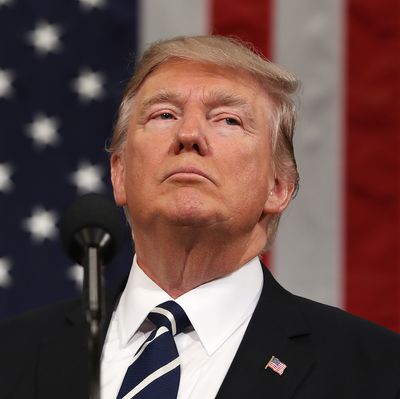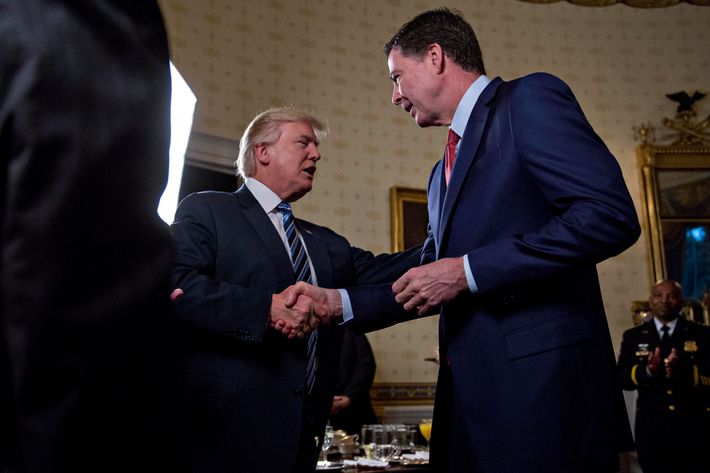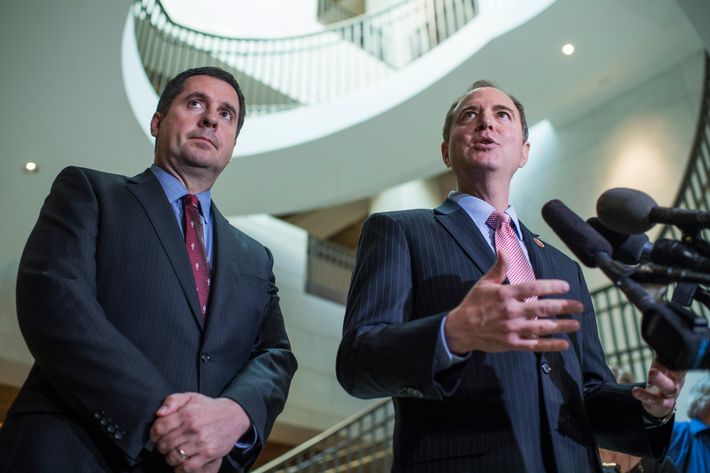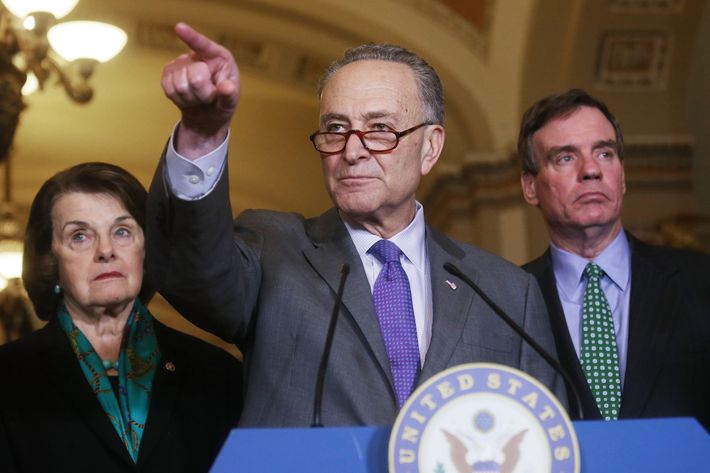
In December, President Obama ordered a review of Russia’s alleged effort to hack the U.S. election. A month later, the FBI, CIA, and NSA said they had concluded with “high confidence” that “Russian president Vladimir Putin ordered an influence campaign in 2016 aimed at the U.S. presidential election” — with the goal of helping Donald Trump.
Months later, we still don’t have many answers about Russia’s operation, or regarding the explosive allegations about the Trump campaign. That’s not due to lack of trying; U.S. intelligence agencies have reportedly been investigating for more than a year, and at least four congressional committees have discussed conducting their own probes. But each step of the process has been complicated by leaks and political accusations — and to make matters worse, the president keep blasting out dubious allegations on Twitter.
Here’s what we know about the efforts to get to the bottom of Russia’s efforts to influence the U.S. election — and why many say they aren’t going far enough.
The FBI
The FBI doesn’t usually comment on the existence or nonexistence of investigations (though we’ve seen some notable exceptions in the last year). Shortly before Trump’s inauguration, FBI director James Comey angered senators by refusing to comment on whether the bureau was investigating Trump’s ties to Russia, or even on his criteria for acknowledging an investigation.
Thanks to a number of leaks, however, we have an idea of what the Russia probe entails. According to McClatchy, last spring the FBI, CIA, Justice Department, NSA, Office of the Director of National Intelligence, and Treasury Department began investigating Russian attempts to influence the election, and the possibility that Kremlin money had secretly made its way to the Trump campaign.
The BBC reported that this coordinated investigation, which is being led by the FBI, was launched after the director of the CIA saw a recording about Russia’s attempt to influence the U.S. election:
Last April, the CIA director was shown intelligence that worried him. It was — allegedly — a tape recording of a conversation about money from the Kremlin going into the U.S. presidential campaign.
It was passed to the U.S. by an intelligence agency of one of the Baltic States. The CIA cannot act domestically against American citizens so a joint counterintelligence taskforce was created.
The current scope and status of the investigations are unclear. In February, Reuters reported that the FBI was pursuing at least three separate probes. The FBI’s Pittsburgh office, which often handles cybersecurity investigations, is working to identify who was behind the hacking of the Democratic National Committee’s computer systems. The San Francisco office is trying to identify “Guccifer 2,” the person or group who hacked Clinton campaign manager John Podesta’s emails. FBI counterintelligence agents in D.C. are looking into leads from informants and foreign communication intercepts, including financial transactions by Russians believed to have links to Trump associates.

The New York Times reported in January that the counterintelligence agencies are looking at intercepted communications and financial transactions as part of its investigation into possible ties between Russian officials and Trump associates. The FBI was said to be examining former Trump campaign chairman Paul Manafort, as well as former Trump advisers Carter Page and Roger Stone.
Last month, the Times said phone records and calls intercepted by U.S. intelligence agencies show that Trump campaign officials and associates had repeated contact with senior Russian intelligence officials in the year before the election. The Trump camp denies this.
The Senate Intelligence Committee
The most robust congressional investigation is taking place in the Senate Select Committee on Intelligence — though, like all of the congressional probes, it relies on information collected by the intelligence community.
The committee announced it would conduct an “independent review” after the intelligence agencies said in January that they believed Russia had tried to influence the election on behalf of Trump — though the senators stressed that they had “no reason to doubt the findings.” Chairman Richard Burr and ranking Democrat Mark Warner said this would include “any intelligence regarding links between Russia and individuals associated with political campaigns.”
FBI director Comey briefed the committee behind closed doors on February 17. “I have a high level of confidence that we’ll get what we need,” Senator Warner said after the meeting.
The committee is still gathering information. Last month it sent letters to more than a dozen “organizations, agencies, and officials,” asking them to preserve records related to the investigation. White House staffers were ordered to comply.
Senate Majority Leader Mitch McConnell said it’s “highly likely” that the committee will look at former national security adviser Michael Flynn’s discussions with the Russian ambassador, and Warner said he wants Flynn to testify.
Initially Burr told reporters that the probe wouldn’t look into the Trump campaign, but Politico reported that he backtracked after Democrats threatened to boycott the investigation.
For a few weeks the committee appeared united, but in late February, reports emerged that the White House had asked Burr to help knock down stories about Trump associates communicating with Russians during the campaign. Burr was one of Trump’s staunchest supporters in the Senate and served as a national security adviser to the campaign.
Burr acknowledged that he talked with the White House, then disputed the Russia report in conversations with reporters. “I felt I had something to share that didn’t breach my responsibilities to the committee in an ongoing investigation,” he said.
Senate Minority Leader Chuck Schumer said Burr had been put “on notice,” and Warner said he had “grave concerns” about the independence of the investigation. Democratic operatives told Politico that they’re pleased with the progress of the investigation so far, so they’re holding back on airing their issues with Burr.
The House Intelligence Committee
There’s yet more tension between the two representatives leading the corresponding investigation in the House. Intelligence chair Devin Nunes was an early Trump supporter and a member of his transition team. Like Burr, the White House asked Nunes to help knock down reports that there were repeated contacts between Trump officials and Russian operatives.
“As of right now, I don’t have any evidence of any phone calls. It doesn’t mean they don’t exist … What I’ve been told by many folks is that there’s nothing there,” Nunes told the Washington Post last week. Echoing the president, he said the real problem is the frequent leaks about the Russia investigation, not their content.
Representative Adam Schiff, the committee’s top Democrat, said it was too early to rule out ties between Trump aides and Russian officials.
“We don’t know whether there were U.S. persons involved, but it is our responsibility to find out,” Schiff said on MSNBC. “And I don’t think anyone on the committee, or our chairs in the House or Senate, ought to be stating a conclusion or deeming it their responsibility to push back on unfavorable press stories.”

Last week, Nunes and Schiff said they had approved a six-page classified document laying out the scope of their investigation. It includes possible contacts between the Trump team and Moscow, as well as possible leaks of classified information from the intelligence community.
But the two committee leaders have continued to clash. After President Trump accused President Obama of wiretapping Trump Tower, Nunes said the House Intelligence Committee would “make inquiries into whether the government was conducting surveillance activities on any political party’s campaign officials or surrogates.” Schiff called Trump’s claim “as destructive as it was baseless.”
Another issue: The House Intelligence Committee is underfunded and understaffed, according to the Daily Beast. Schiff said he suggested to the Senate Intelligence Committee that they could work together, but they weren’t interested.
“I would have to imagine one of the concerns — and I’m just speculating here — that the Senate may have is if they feel that their investigation is proceeding very much in a bipartisan fashion, and their concern may be that the House isn’t, they may have concerns about combining the two,” Schiff said.
The House Oversight Committee
Committee chair Jason Chaffetz has been resistant to calls to investigate the Trump administration, and he’s taken little action on the Russia matter.
Following Flynn’s resignation, Chaffetz said the House Oversight Commitee wouldn’t be looking into the issue because it’s “working itself out.” Instead, he and House Judiciary Committee Chairman Bob Goodlatte wrote a letter to the Justice Department’s inspector general, demanding an investigation into whether officials “mishandled” classified information when they leaked about Flynn’s communications to the press.
Chaffetz did eventually join a Democratic effort to look into whether Russian officials paid Flynn for his appearances in Moscow in 2015, which may have violated the Constitutions’s Emoluments Clause. Chaffetz and Representative Elijah Cummings, the senior Democrat on the committee, sent a letter to the company that handled Flynn’s speaking engagements, requesting more information.
The Senate Judiciary Committee
The top Republican and Democrat on the Senate Judiciary Committee —Chuck Grassley and Dianne Feinstein, respectively — asked the Justice Department and the FBI to brief them on the circumstances of Flynn’s resignation, and to share transcripts of Flynn’s intercepted calls to the Russian ambassador.
In February, Republican Lindsey Graham and Democrat Sheldon Whitehouse, who lead the panel’s Subcommittee on Crime and Terrorism, announced they were launching their own investigation into Russia’s election meddling.
“Our goal is simple — to the fullest extent possible we want to shine a light on Russian activities to undermine democracy,” the senators said. “Our efforts will be guided by the belief that we have an obligation to follow the facts wherever they may lead.”
Graham said this week that they would also look into Trump’s wiretapping claims. “It would be earth-shattering if the former administration illegally wiretapped a campaign,” he said. “If the FISA court issued a warrant that would be pretty stunning too, because they’d have to have probable cause,” he said.

Other Options
The fact that Trump supporters helm the key congressional probes didn’t inspire much confidence, even before it was revealed that they were commenting on the Russia scandal at the behest of the White House. Democrats and even some Republicans have called for a more rigorous investigation, either by a special congressional committee or a special prosecutor.
However, while those options may be perceived as more independent, they do have their drawbacks. As the Washington Post notes, it can take years for a special congressional probe to complete its investigation. And, like with the House Select Committee on Benghazi, Republicans and Democrats may not be able to agree on their conclusions.
Now that Attorney General Jeff Sessions has recused himself from the investigation, Senator Schumer is demanding that Deputy Attorney General nominee Rod Rosenstein commit to appointing a special prosecutor during his confirmation hearing this week. A recent CNN/ORC poll found that about two-thirds of Americans agree that a special prosecutor, not Congress, should oversee Trump’s alleged ties to Russia.
But Peter Zeidenberg, who served as an assistant special counsel in the prosecution of Scooter Libby, argued that, in this case, appointing a special prosecutor “would likely be a mistake.” That person’s mission would be to determine if a crime was committed, not to make information public:
If, after a full criminal investigation, it was determined that a crime occurred but the critical evidence was not obtainable — say, for purposes of argument, that this evidence was in Russia, unobtainable by subpoena — then it would be improper to seek an indictment. Critically, the entire investigation would then remain secret. It would be a violation of law for a prosecutor to make public the results of a grand jury investigation that did not result in an indictment.
When the allegations involve the undermining of U.S. institutions, there’s only so much the government can do to restore public confidence.






























